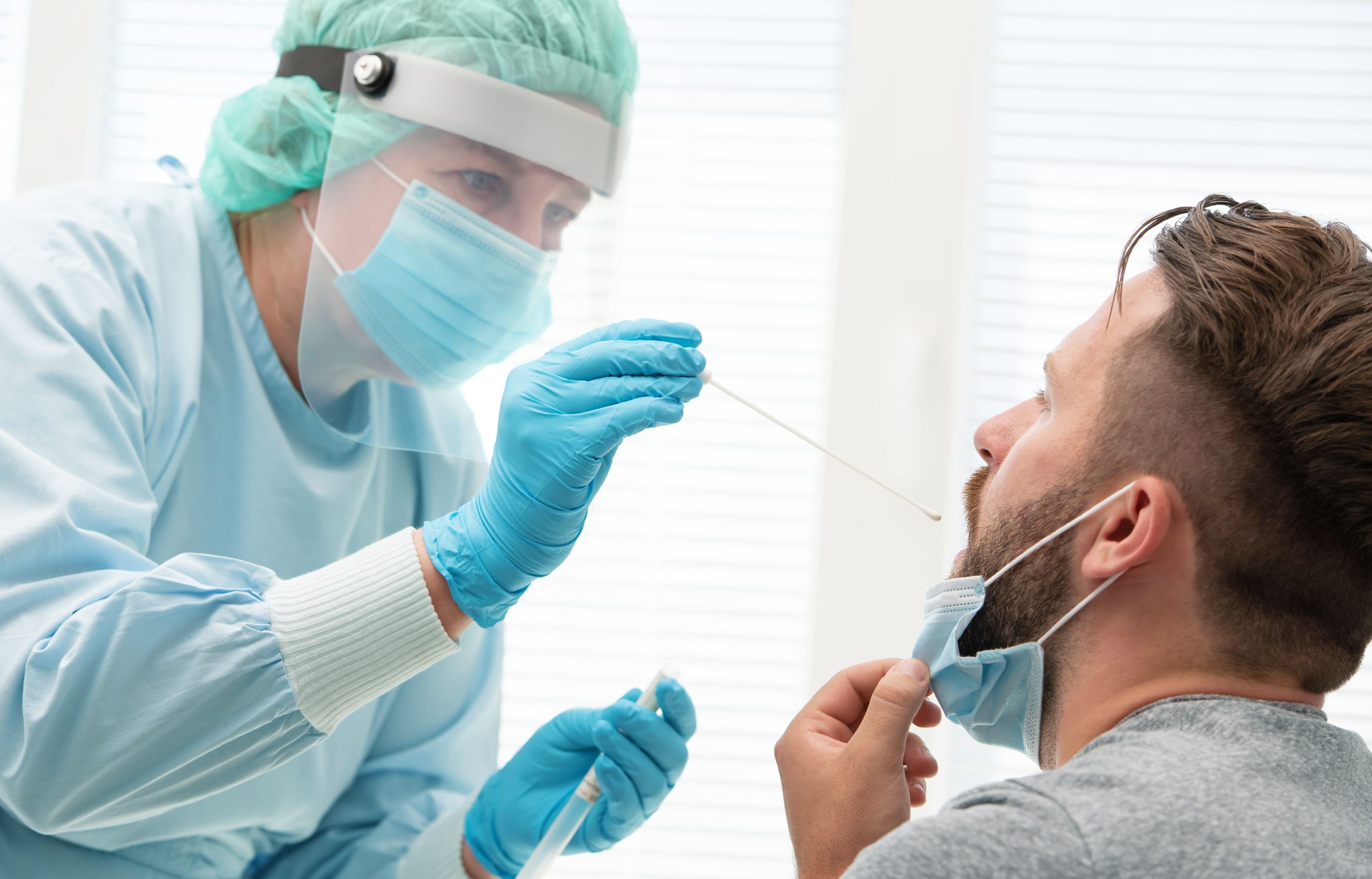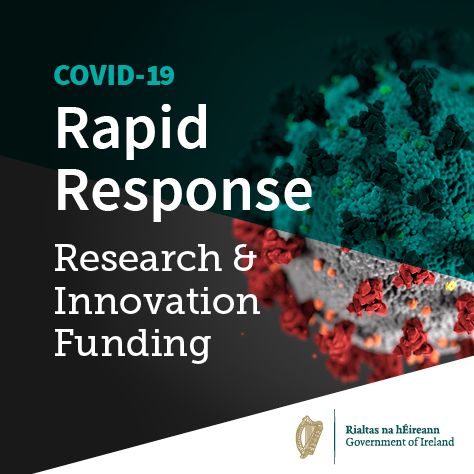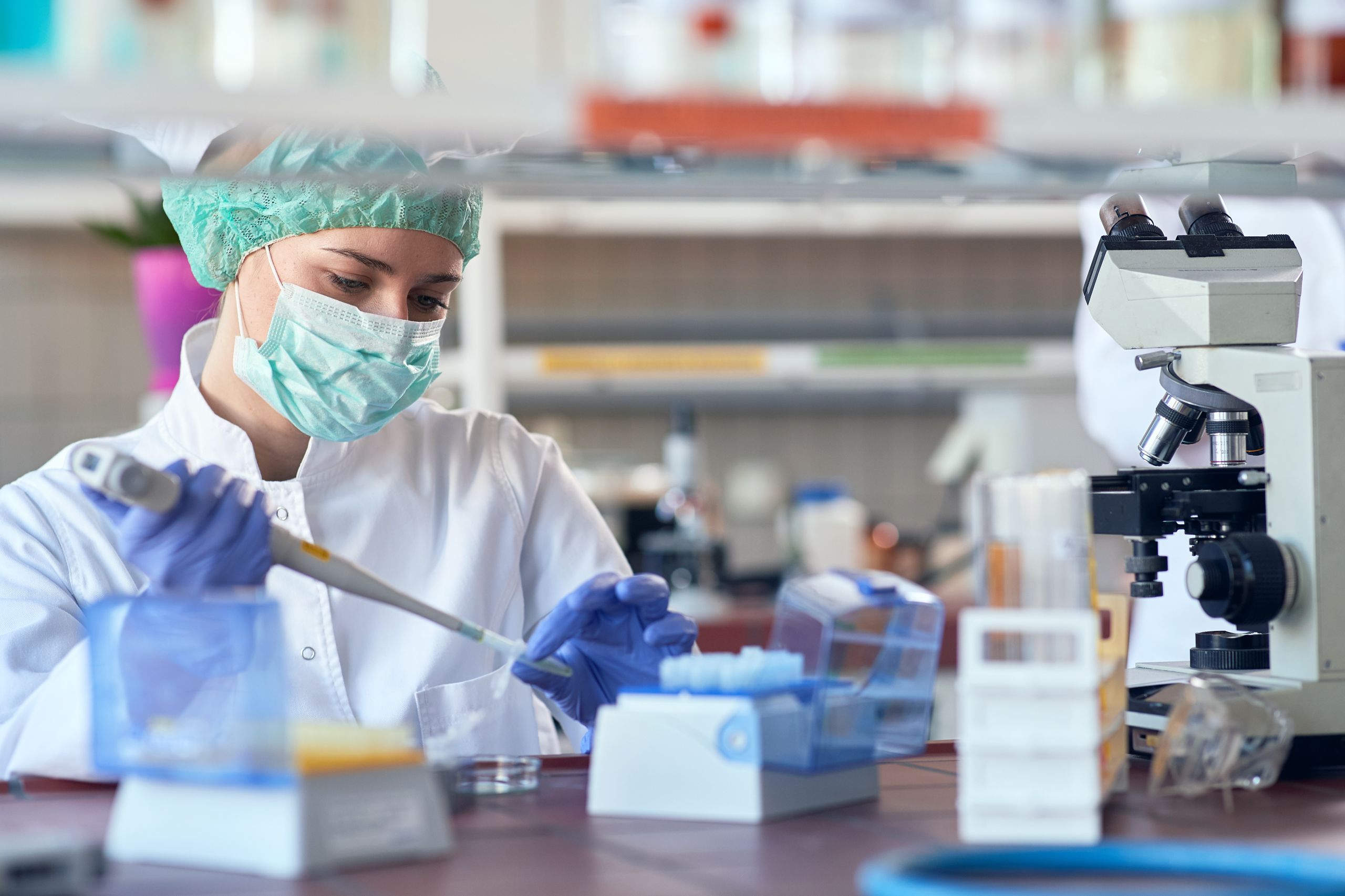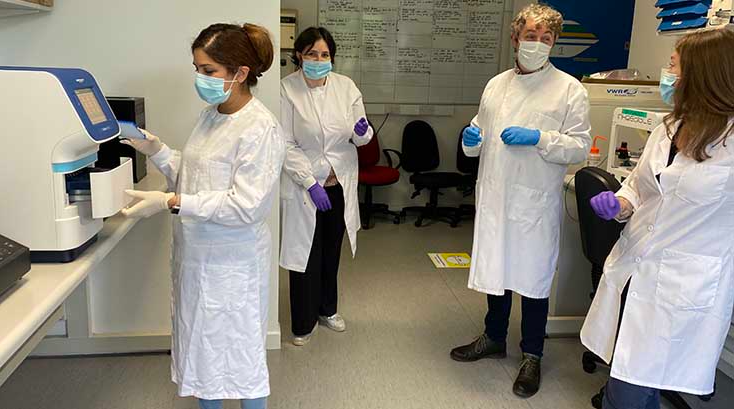Large-scale Serial Covid-19 Screening using Saliva Samples

Until a vaccine is brought to market, mass-testing for the coronavirus is necessary for our society to return to normal. Our researchers are developing high-throughput Covid-19 screening systems of saliva samples using next-generation molecular genetics tools.
Science Foundation Ireland (SFI) is funding a COVID-19 Rapid Response project led by the Ryan Institute at NUI Galway, to combine Covid-19 genetic testing approaches with saliva sampling, using conventional qRT_PCR and also a “synthetic biology” toolbox called CRISPR-Cas.
In collaboration with international partners from the USA and UK, the Genetics and Biotechnology lab of Professor Charles Spillane in the Ryan Institute at NUI Galway has now developed a high-throughput saliva screening system using qRT-PCR and is also developing a rapid CRISPR-Cas based system for detection of the virus in saliva samples. By using pooled samples, they are developing Covid-19 surveillance systems for viral screening of asymptomatic groups of people (households, classes, companies and institutions) on a routine weekly basis. See website for the SFI-funded SalivaScreen Project for more details: www.salivascreen.org

The current PCR testing system for the presence of the Covid-19 is carried out by taking swabs from people’s noses and the back of their throats, which is cumbersome, costly and time-consuming. Current “gold standard” diagnostic testing systems for the presence of Covid-19 are largely based using qRT-PCR assays on the swab samples. In the absence of a vaccine, there is an unmet need to massively scale up both sampling and testing throughput so that routine weekly surveillance testing of groups can enable people to know when members of their group may be infected or not.
In Prof. Spillane’s SFI-funded SalivaScreen Project, the SpillaneLab are conducting saliva-based covid-19 surveillance research studies of workplaces, educational settings and research buildings by combining high-throughout saliva sampling with qRT-PCR (and in the future CRISPR-Cas) assays. During December 2021 and January 2021, Prof. Spillane’s SalivaScreen team are conducting three pilot covid-19 surveillance screens involving routine (e.g weekly) sampling of asymptomatic employees and students who have volunteered in the study. These three pilot studies are being conducted in Galway city in partnership with Thermo King (workplace setting) and Atlantic Language School (educational setting), with the third pilot involving screening of researchers in the Aras de Brun building in NUI Galway.
The pilot studies are being used to develop high-throughput workflows and also track the prevalence of the virus amongst groups of asymptomatic individuals over a time period involving changes in covid-19 suppression measures.

“On St. Patricks day I sent a Briefing Note to a range of political leaders and government bodies in Ireland recommending that we should seriously consider a mass-testing strategy for phased exit from Covid-19 lockdown measures that could allow our economy and society to function.
While progress has since been made on behavioural change ‘suppression’ measures to limit the growth of the pandemic in many countries, there remains significant potential for developing and deploying cheaper and more rapid viral sampling and test systems that could be scaled up for testing large groups of people on a routine weekly basis for the presence or absence of the virus."
The Covid-19 Rapid Response SalivaScreen project is using the gold standard qRT-PCR assay and also developing a highly-precise genetic “homing system” called CRISPR-Cas to develop protocols for testing saliva samples for the presence or absence of SARS-CoV-2, the virus that causes Covid-19. The SpillaneLab have developed workflows for rapidly screening individual saliva samples as well as pooled samples from groups of people, to enable routine mass weekly screening in households, schools, companies and other group settings. By developing a rapid, targeted diagnostics and workflow (that can be used for both surveillance screening and diagnostics) using saliva samples, the research hopes to enable Covid-19 exit strategies from lockdown in Ireland and globally based on large-scale, weekly mass screening.

“As we progress, I am interested in partnering our research with any groups (companies, schools, institutions, healthcare workers and communities) who may be interested in working with us to scale-up routine weekly screening systems so that groups can better operate for the duration of the Covid-19 pandemic, particularly over the months ahead in Ireland and internationally until vaccine roll-out reaches levels sufficient to significantly slow the spread of the virus. It is important that Science Foundation Ireland is supporting a swathe of rapid response Covid-19 research and innovation activities that have potential to improve the resilience of our public health, society and economy, during and beyond the pandemic.”
Professor Charles Spillane
Established Professor & SFI Investigator
Director of Ryan Institute
Head of Genetics & Biotechnology Lab
The Ryan Institute
The Ryan Institute is NUI Galway's largest research institute comprised of 95 Research Groups and 12 Research Centres/Clusters that are responsible for over 350 funded research projects comprising circa. 20% of the overall research income of NUI Galway.
The Ryan Institute's sustainability research mission focuses on four thematic research areas, namely (1) Marine & Coastal, (2) Energy & Climate Change, (3) Agriculture & BioEconomy, and (4) Environment & Health. The 95 Research Groups (each led by a Ryan Institute Principal Investigator) within the Ryan Institute collectively consist of circa 500 full time researchers, including 100+ Postdoctoral Fellows, 50+ Research Assistants, and 250+ PhD students. The Ryan Institute’s 95 research groups generate over one quarter of all research publications and citations from NUI Galway.
The Ryan Institute’s Centre for One Health (COH) conducts research to unravel the complexity surrounding interactions between the environment and human health. The Centre for One Health (COH) is an integral research centre of the Ryan Institute at NUI Galway and brings together leading experts in human health, animal health, microbiology, infectious diseases, epidemiology, diagnostics, vaccine development, agriculture, disease modelling, environmental policy, social marketing and behavioural change from within and outside NUI Galway. The COH places sustaining human health, animal health and environmental health at the centre of public policy through teaching, research and advocacy.


